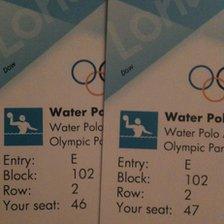London 2012: Probe as sponsors' tickets sold to public
- Published

The company at the heart of the allegations is CoSport
An investigation has been launched after the BBC found sponsors' Olympics tickets had been sold to the public for 20% more than their face value.
This is a breach of the International Olympic Committee's rules.
Three of the biggest sponsors of London 2012, Dow Chemical, Acer and GE, have been caught up in the scandal.
But there is no suggestion of any wrongdoing by any of the companies as the tickets were sold on by a separate agency.
However, there will be severe embarrassment that the tickets have ended up being sold for inflated fees.
The International Olympic Committee (IOC) and Locog, the London 2012 Organising Committee, have launched a joint investigation into the allegations.
The company at the heart of the allegations is CoSport, based in the US. It is the world's largest authorised re-seller of Olympic tickets.
It has contracts to sell London 2012 tickets to residents of the US, Canada, Australia, Brazil, Austria, Bulgaria, Norway and Sweden.
Hundreds of British citizens have purchased tickets from CoSport, taking advantage of EU laws which permit them to buy from the allocations given to other European countries.
Sponsors' stamp
It was only when the delivery of CoSport tickets to the UK began this week that it became clear that many of those sold to the British public were actually tickets which had been promised to sponsors, rather than any individual countries.
The BBC has been contacted by a number of people who were concerned when they realised that a sponsor's name had been stamped on their tickets.
Foreign re-sellers are permitted to charge 20% more than the face value of London 2012 tickets, but are not allowed to sell any tickets which have been allocated to sponsors.
They are only permitted to market tickets which have been distributed to the competing nations.
British ticket hunters assumed that when they were charged a 20% premium by CoSport, they were purchasing part of the allocation handed out to Austria, Norway and Sweden.
Many were shocked when they eventually discovered that they had bought sponsors' tickets.
London 2012's decision to stamp a sponsor's name on tickets has made it much easier to trace the original source of any purchases.
Around 700,000 tickets have been made available to the sponsors of the Games. CoSport has been employed by top-tier sponsors Dow, Acer and GE to distribute tickets internally to staff who work for those companies.
It appears that it is the spare tickets which have ended up being sold to the British public.
Rule breach
With demand for London 2012 tickets so high, the issue of the number of tickets handed over to sponsors has been a sensitive one. Sponsors have received 8% of all London 2012 tickets.
In Beijing, sponsors were blamed for not using some of their tickets when there were a large number of empty seats at some venues.
In a joint statement, the IOC and Locog told the BBC: "Co-Sport is an ATR [authorised ticket reseller] for a number of NOCs [national Olympic committees], including Sweden, Norway, the USA, Australia and Brazil.
"Its sister company Jet Set Sport provides hospitality programmes for a number of sponsors.
"Locog and the IOC has made it very clear we will take action if any ATR is in breach of the rules. We will contact Co-Sport and Jet Set to find out why the tickets they have been allocated have been distributed in this way."
The sponsors will also want to find out how their tickets have ended up being sold for inflated prices.
A spokesperson from Dow said: "Dow uses a third-party hospitality company which is approved by the IOC to manage our ticket allocations. We understand that both the IOC and Locog are looking into this and will handle appropriately. "
London 2012 says that one of its priorities will be to protect those people who have innocently bought the sponsors' tickets, so there is no question of any of these tickets being cancelled.
Last month, the IOC suspended the sales process for the Sochi 2014 Winter Games while it investigates allegations in the Sunday Times that Olympic officials and agents representing 54 countries offered London 2012 tickets on the black market.
These revelations about the sale of sponsors' tickets are bound to increase the pressure on the IOC to reform its ticketing system for future Games.
CoSport has not responded to numerous BBC phone calls and emails.
- Published13 July 2012
- Published13 July 2012
- Published12 July 2012
- Published2 July 2012
- Published27 June 2012